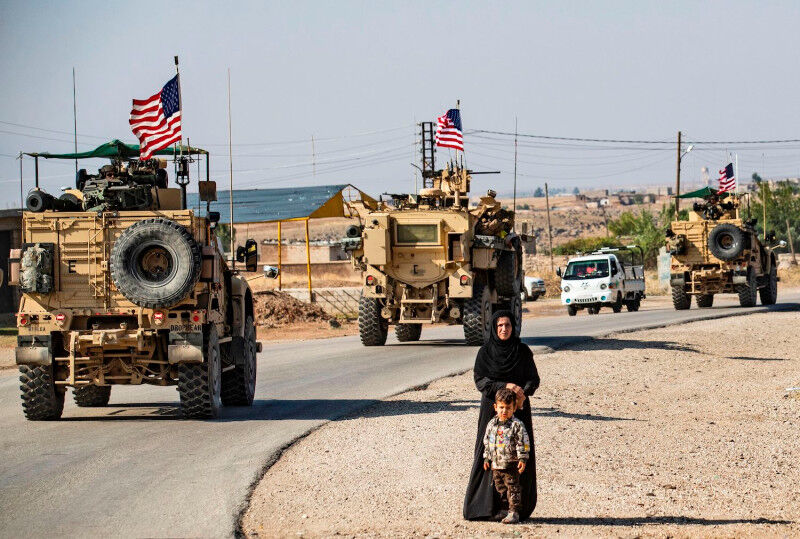Kheirollah Parvin told the Strategic Council on Foreign Relations that the government of Syria should be seeking the withdrawal of the United States and other occupiers from its territory through the Security Council of the United Nations and other government should help Syria in this effort.
Explaining the legal status of the US presence in Syria, she said the government of Syria is enjoying an independent sovereignty, is a member of the United Nations and has the three main conditions of nation-state i.e. it has sovereignty, population and territory.
She added that while Syria was grappling with civil war, it remained an active member of the United Nations and no other country, party or group can succeed the Syrian government. Therefore, from the viewpoint of the United Nations, the government of Syria has been recognized as an independent government with sovereignty.
This professor of the University of Tehran said under such circumstances, and according to the Charter of the United Nations, sovereignty as a principle has been internationally recognized and no government is entitled to interfere in the domestic affairs of other countries.
Parvin said that according to the Charter of the United Nations, any situation which creates a disruption in the sovereignty of countries is forbidden. He added that definitely there is inequality in the Charter of the United Nations and the international law concerning the issue of veto power and permanent membership in the Security Council however no country has the right to interfere in the domestic affairs of other countries and as it has been enshrined in the Charter of the United Nations, no country can impose its military presence on the other country or define a policy line for it.
Emphasizing the necessity of incorporating the right to equal sovereignty for Syria, she said if a country is grappling with civil war or natural disasters or is in need of help, other governments and the United Nations can enter that country and rescue it with the request and formal invitation of the ruling government. However, she said, this action should be according to the request of the ruling government, in coordination with the United Nations and for a limited period.
This expert of international law added that the presence of the US in Syria has not been requested by the ruling government of Syria and it does not aim at helping the people of Syria but is a bullying presence in violation of the Charter of the United Nations and international law and regulations. The modus operandi taken by the US government in international law suggests as if the US considers itself entitled to special rights.
Referring to the ramifications of the US presence in some areas and countries such as Iraq, Afghanistan and Syria and the intensification of insecurity, instability, extremism, murder of people and plunder of national recourses, she said all these incidents demonstrate the fact that the presence of the US in these countries and Syria as well is an illegitimate and unlawful presence.
“Today, the US is an occupying country in Syria and is controlling some parts of the Syrian territory and has made them out of the control of the ruling government and is plundering the underground and oil resources of the Syrian nation; additionally, groups such as separatist groups have been strengthened by the US in Syria and are active is more parts of this country.”
This Tehran University professor said solutions to legally confront the US occupation in Syria are clear and specific but there are impediments.
“The government of Syria has been weakened as the result of civil war inflicted on it as of 2011. However, it has been able with the help of other countries to overcome the problems and re-gain its sovereignty over the country except the areas controlled by the US government and some separatist groups.” The government of Syria should be seeking the withdrawal of American forces and other occupiers from its territories through the Security Council and other countries should be heling Syria.
Referring to inequalities in international law and the veto power for the US, she said countries of the world should be demanding unanimously in the General Assembly the withdrawal of the United States and other occupiers from Syria. Countries of the region, she said, as well as the Muslim and Arab worlds and other independent countries can play a role in this respect.
Stressing the significance of playing an active role by countries such as China, Russia and other independent countries for resistance against the occupations in Syria, she said such measures should be explained to the global public opinion and more pressures should be exerted on the US.
Parvin considered resistance and steadfastness as important against the destructive role of the United Stations in the countries of the region, the axis of resistance and the Muslim world, saying that all countries, especially the Arab governments, should be aware that in future they will not be immune from such aggressions and the US can impose a blow on them any time with this approach.
She concluded that the government of Syria has taken control of all its territory and has been successful in establishing security and previous excuses for fighting terrorist groups by other countries are not acceptable.










0 Comments